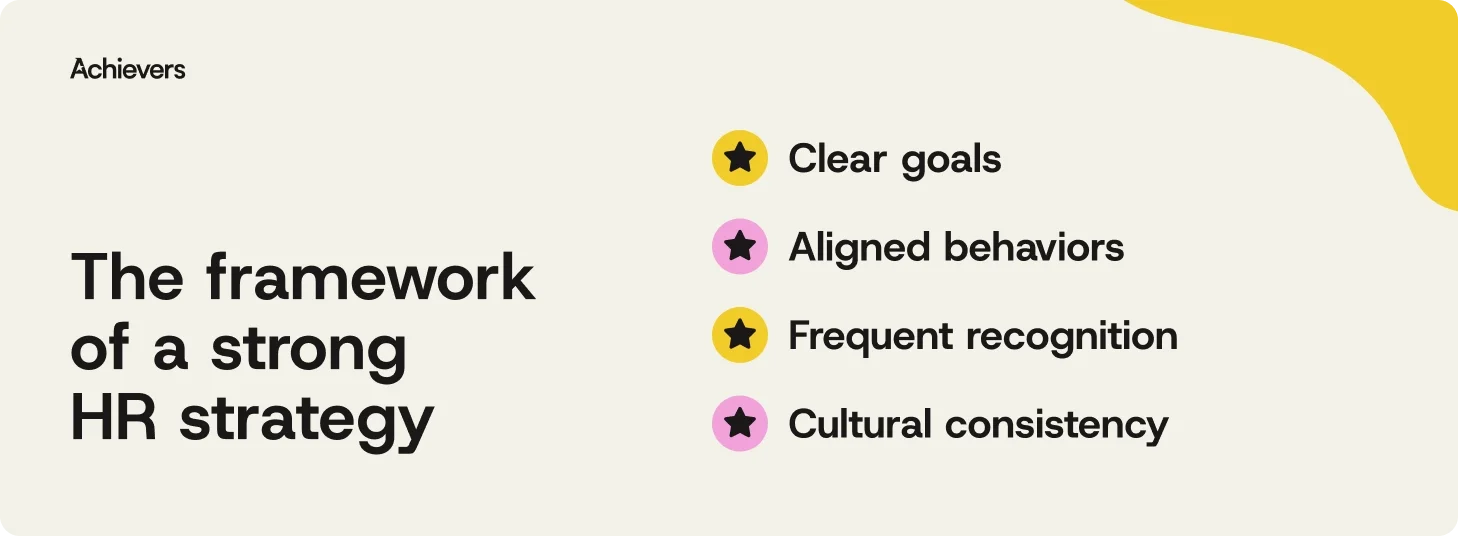Table of contents
Picture this: Your company’s culture is thriving, turnover’s on mute, and engagement scores are almost suspiciously high. That’s not luck — it’s strategy.
HR strategy, to be specific. But let’s lose the jargon. HR strategy is simply your game plan for aligning people practices with business goals. It’s not some HR-only initiative that gets parked next to the onboarding checklist. It’s foundational. Because when your people are aligned, recognized, and empowered — results follow.
And yes, it’s just as critical to the bottom line as any go-to-market roadmap. Maybe more.
So, what does real strategy look like — and how is it different from just “doing HR stuff”? Let’s break it down.
HR strategy vs. HR operations: Know the difference
Let’s clear something up: HR operations and HR strategy aren’t the same — though they’re often mistaken for twins.
Ordering name tags? That’s operations. Planning for the workforce you’ll need five years from now (and making sure they actually want to stick around)? That’s strategy.
Ops keeps the lights on — payroll, benefits, onboarding logistics. All essential. But strategy asks the bigger questions: How do we shape a culture that attracts the right talent? How do we align people to our company’s purpose?
It’s the difference between checking boxes and changing outcomes. One manages today. The other builds tomorrow.
Why HR strategy matters more than ever
The days of winging it are over. Between hybrid work, talent shortages, and growing expectations around DEI, today’s workforce isn’t just changing. It’s evolving at warp speed.
That’s where HR strategy comes in. A good one doesn’t wait for problems to pop up — it anticipates them. It aligns your people, culture, and priorities so you’re ready before the next disruption hits (because spoiler: it will).
The best-run businesses don’t treat strategy as a backup plan. They use it to shape workforce behavior and build resilience from the inside out.
In fact, companies with a strong HR strategy are 12x more likely to have a highly engaged workforce — and that engagement is what drives performance, retention, and innovation.
No more scrambling. Just a smarter way forward.
The people payoff: Retention, engagement, and alignment
A solid HR strategy isn’t just good for business — it’s good for people. When it clicks, employees feel seen, heard, and appreciated. They know how their work connects to something bigger. And that connection? It’s what makes them stay.
(Spoiler alert: It takes more than pizza Fridays.)
According to Achievers Workforce Institute (AWI) data, employees who feel recognized at work are 3x more likely to be engaged — and 53% less likely to job hunt. That’s not just warm and fuzzy. That’s strategy paying off in retention and performance.
Because when people are aligned to your culture, they’re not just happier — they’re also a whole lot more effective.
The business case: Strategy that earns its seat at the table
Let’s call it what it is: HR strategy isn’t just about making work feel good — it’s about making business work better.
The right strategy doesn’t sit quietly in the background. It drives growth. Fuels innovation. Builds resilience. It’s the difference between reacting to change and being ready for it.
And yes, it absolutely belongs at the decision-making table. Because a strategy that shapes culture, aligns behavior, and boosts performance? That’s not HR for HR’s sake — that’s how the best-run businesses move forward.
People-first doesn’t mean business-second. It means business-better.
Common pitfalls (and how to avoid them)
HR strategy isn’t a slow cooker — you can’t just “set it and forget it.” And what worked for your competitor? Probably won’t work for you. Every organization has its own culture, goals, and people dynamics — so copying and pasting someone else’s strategy is a fast track to frustration.
Here are a few common missteps to watch out for (and how to steer clear of them):
- Misalignment with company goals: If your people strategy isn’t supporting your business strategy, it’s just busy work. Start by connecting the dots between workforce behavior and organizational priorities.
- Lack of executive buy-in: Without leadership support, even the best strategy stalls. Bring execs into the conversation early — and back it up with data on engagement, retention, and ROI.
- Ignoring employee feedback: Strategy made in a vacuum rarely lands. Use employee feedback to guide decisions and adjust as needed. After all, your people know what’s working (and what’s not).
The good news? With a thoughtful, flexible strategy, these challenges become opportunities — to listen more, lead better, and build a workforce that’s aligned for impact.
What a strong HR strategy actually looks like
So, what does a real HR strategy look like in action? Spoiler: It’s not a dusty PDF that gets filed away after one all-hands meeting.
A strong strategy is alive in your day-to-day. It looks like:

- Clear goals that tie people priorities to business outcomes
- Aligned behaviors that show up in how teams work, lead, and grow
- Frequent recognition that reinforces what “great” looks like
- Cultural consistency that doesn’t shift with every org chart update
It’s about building a workplace where expectations are understood, good work is visible, and people feel connected to purpose.
That’s why forward-thinking companies use platforms like Achievers — to keep strategy visible, behaviors aligned, and culture moving in the right direction.
Don’t leave your people strategy to chance
Your business wouldn’t operate without a plan — so why should your people strategy be any different?
Guesswork might get you through a few quarters, but it won’t build the kind of workforce that drives long-term success. The best-run organizations don’t just react to change — they shape it, with HR strategies that align people, culture, and goals.
That’s where Achievers comes in. Our platform helps organizations turn recognition and engagement into strategic pillars — not afterthoughts — by reinforcing the behaviors that move your business forward.
Ready to put a real people strategy in motion? Let’s build something better, together.



